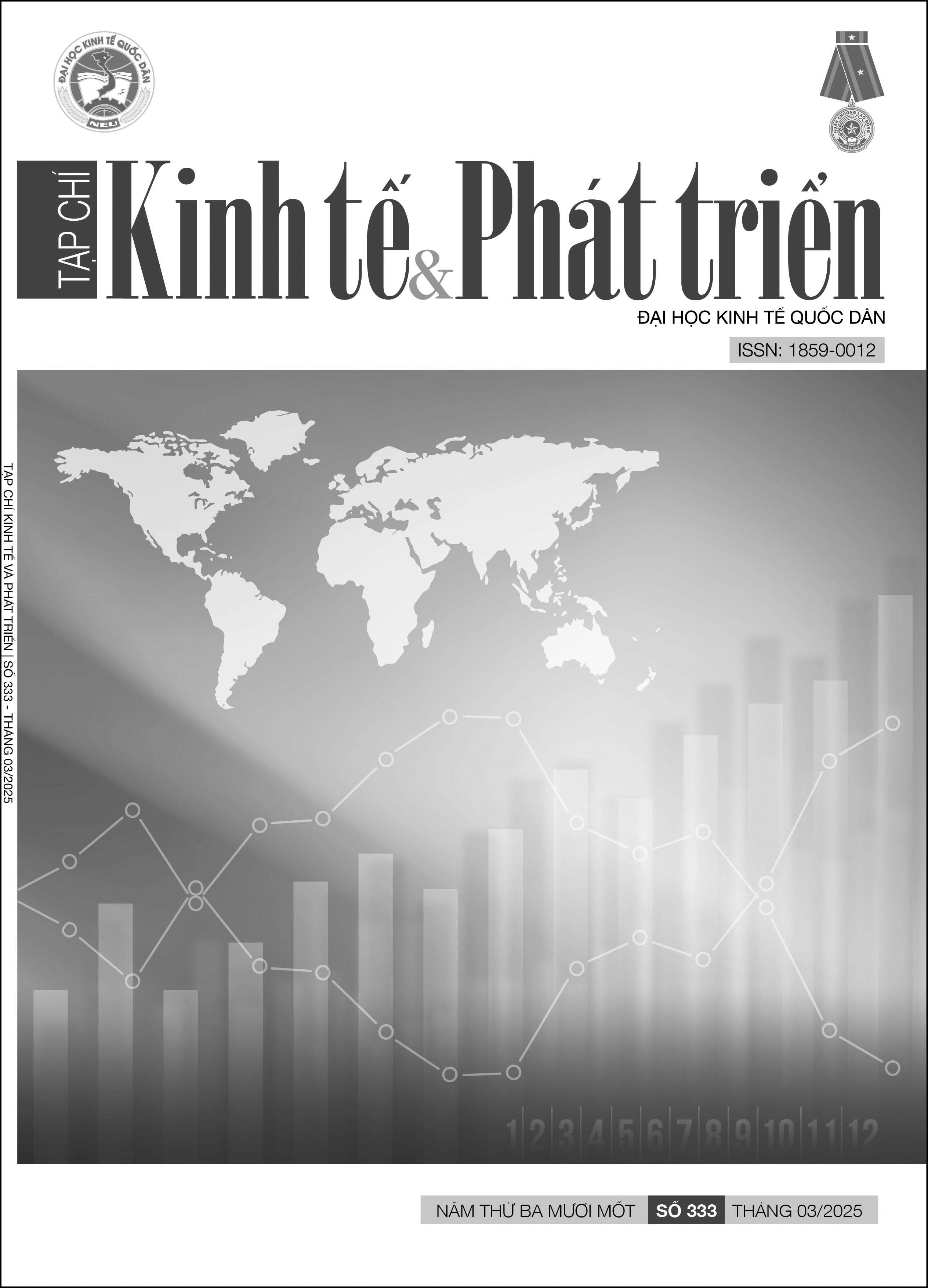Ảnh hưởng của giá trị cảm nhận và nhận thức rủi ro đến ý định tham gia du lịch mạo hiểm của thế hệ Z tại thành phố Cần Thơ
DOI:
https://doi.org/10.33301/JED.VI.2062Từ khóa:
du lịch mạo hiểm, giá trị cảm nhận, nhận thức rủi to, thế hệ Z, ý định tham giaTóm tắt
Nghiên cứu này được thực hiện để phân tích ảnh hưởng của giá trị cảm nhận và nhận thức rủi ro đến ý định tham gia du lịch mạo hiểm của thế hệ Z tại thành phố Cần Thơ. Các giả thuyết được kiểm định bằng phương pháp phân tích cấu trúc tuyến tính (PLS-SEM) trên bộ dữ liệu khảo sát từ 250 người thuộc thế hệ Z tại thành phố Cần Thơ. Kết quả nghiên cứu cho thấy giá trị cảm nhận và nhận thức rủi ro đều có ảnh hưởng tích cực đến ý định tham gia du lịch mạo hiểm. Ngoài ra, có năm nhân tố bao gồm: (1) tính mới lạ, (2) hưởng thụ, (3) sự giải trí, (4) giá trị cảm xúc, và (5) nhận thức rủi ro có ảnh hưởng tích cực đến giá trị cảm nhận trong bối cảnh du lịch mạo hiểm. Kết quả này cung cấp cơ sở khoa học để các công ty du lịch và nhà điều hành tour trong việc xây dựng chiến lược kinh doanh hiệu quả, khuyến khích thế hệ Z tham gia vào các hoạt động du lịch mạo hiểm để thúc đẩy phát triển du lịch bền vững tại Việt Nam.
Tài liệu tham khảo
Ajzen, I. (1991), ‘The Theory of Planned Behavior’, Organizational behavior and human decision processes, 50(2), 179-211.
Anna Joseph (2024), Why do we have a sense of adventure? Exploring the psychological and evolutionary factors driving the pursuit of new experiences, Accessed on June 5, 2024 at: https://scientificorigin.com/why-do-we-have-a-sense-of-adventure-exploring-the-psychological-and-evolutionary-factors-driving-the-pursuit-of-new-experiences.
ATTA (2019), What is Adventure Travel, Accessed on May 30, 2024 at:
https://solutions.adventuretravel.biz/what-is-adventure-travel ().
Buckley, R. (2012), ‘Rush as a key motivation in skilled adventure tourism: Resolving the risk recreation paradox’, Tourism management, 33(4), 961-970.
Cục Thống kê Thành phố Cần Thơ (2023), Niên giám Thống kê Cần Thơ 2023.
Duman, T., & Mattila, A. S. (2005), ‘The role of affective factors on perceived cruise vacation value’, Tourism management, 26(3), 311-323.
Gowreesunkar, V., & Sotiriades, M. (2015), ‘Entertainment of leisure tourists in island destinations: Evidence from the Island of Mauritius’, African journal of hospitality, tourism and leisure, 4(2223), 1-19.
Habibi, A., Ariffin, A. A. M., & Aziz, N. A. (2018), ‘The influence of perceived benefits, perceived sacrifices and perceived value on behavioural intention in the context of medical tourism’, International Journal of Services, Economics and Management, 9(3-4), 295-316.
Hair, J., Black, B., Babin, B., & Anderson, R. (2010), Multivariate data analysis 7th Pearson prentice hall, Upper Saddle River, NJ, 629-686.
Houge Mackenzie, S. & Hodge, K. (2020), ‘Adventure recreation and subjective well-being: A conceptual framework’, Leisure Studies, 39(1), 26-40.
Hoyle, R.H. (1995), ‘The structural equation modeling approach: Basic concepts and fundamental issues’, In Structural equation modeling: Concepts, issues, and applications, Hoyle, R.H. (Ed.), Sage Publications, Inc., 1-15.
Huddart, D., Stott, T. (2020), ‘What Is Adventure Tourism?’, In Adventure Tourism, Palgrave Macmillan, Cham, DOI: 10.1007/978-3-030-18623-4_1.
Jin, X., Xiang, Y., Weber, K. & Liu, Y. (2019), ‘Motivation and involvement in adventure tourism activities: a Chinese tourists' perspective’, Asia Pacific Journal of Tourism Research, 24(11), 1066-1078.
Ma, J. (2013), ‘Emotions derived from theme park experiences: the antecedents and consequences of customer delight’, Doctoral dissertation, University of Queensland, Brisbane, QLD, Australia.
Narvekar, R.H. (2022), ‘Relationship Between Perceived Value, Satisfaction and Behavior Intentions in Adventure Tourism Context’, Doctoral dissertation, Goa University.
Nunnally, J. C., & Bernstein, I. H. (1994), Psychometric theory (3rd ed.), New York, NY: McGraw-Hill, Inc.
Polukhina, A., Sheresheva, M., Efremova, M., Suranova, O., Agalakova, O., & Antonov-Ovseenko, A. (2021), ‘The concept of sustainable rural tourism development in the face of COVID-19 crisis: Evidence from Russia’, Journal of Risk and Financial Management, 14(1), 38.
Prapan Leenoi (2024), Sustainable Tourism' A New Era of Travel Prioritizing Sustainability, Retrieved from https://www.krungsri.com/en/research/research-intelligence/sustainable-tourism-2024.
Rather, A.H. & Bhat, A.A. (2023), ‘Risk perception and behavioural intention of tourists towards risk-prone destinations: The mediating role of place attachment’, Global Business Review, p.09721509231158179.
Sánchez, J., Callarisa, L., Rodriguez, R. M., & Moliner, M. A. (2006), ‘Perceived value of the purchase of a tourism product’, Tourism management, 27(3), 394-409.
Sunggu, F. O. (2022), ‘The Humanity of Generation Z Distracted by Artificial Intelligence’, Retorik: Jurnal Ilmu Humaniora, 10(2), 168-183.
Torabi, Z.A., Shalbafian, A.A., Allam, Z., Ghaderi, Z., Murgante, B. and Khavarian-Garmsir, A.R. (2022), ‘Enhancing memorable experiences, tourist satisfaction, and revisit intention through smart tourism technologies’, Sustainability, 14(5), 2721.
Trân, N.M., Trân, Đ.B. & Huy, H.T. (2016), ‘Nghiên cứu các yếu tố ảnh hưởng đến nhu cầu du lịch nội địa của nhân viên văn phòng tại thành phố Cần Thơ’, Tạp chí Khoa học Đại học cần Thơ, 46), 51-59.
Wang, J., Liu-Lastres, B., Ritchie, B.W. & Pan, D.Z. (2019), ‘Risk reduction and adventure tourism safety: An extension of the risk perception attitude framework (RPAF)’, Tourism Management, 74, 247-257.
Williams P. & Soutar G. N. (2009), ‘Value, Satisfaction, and Behavioural Intentions in an Adventure Tourism Context’, Annals of Tourism Research, 36(3), 413-438.





